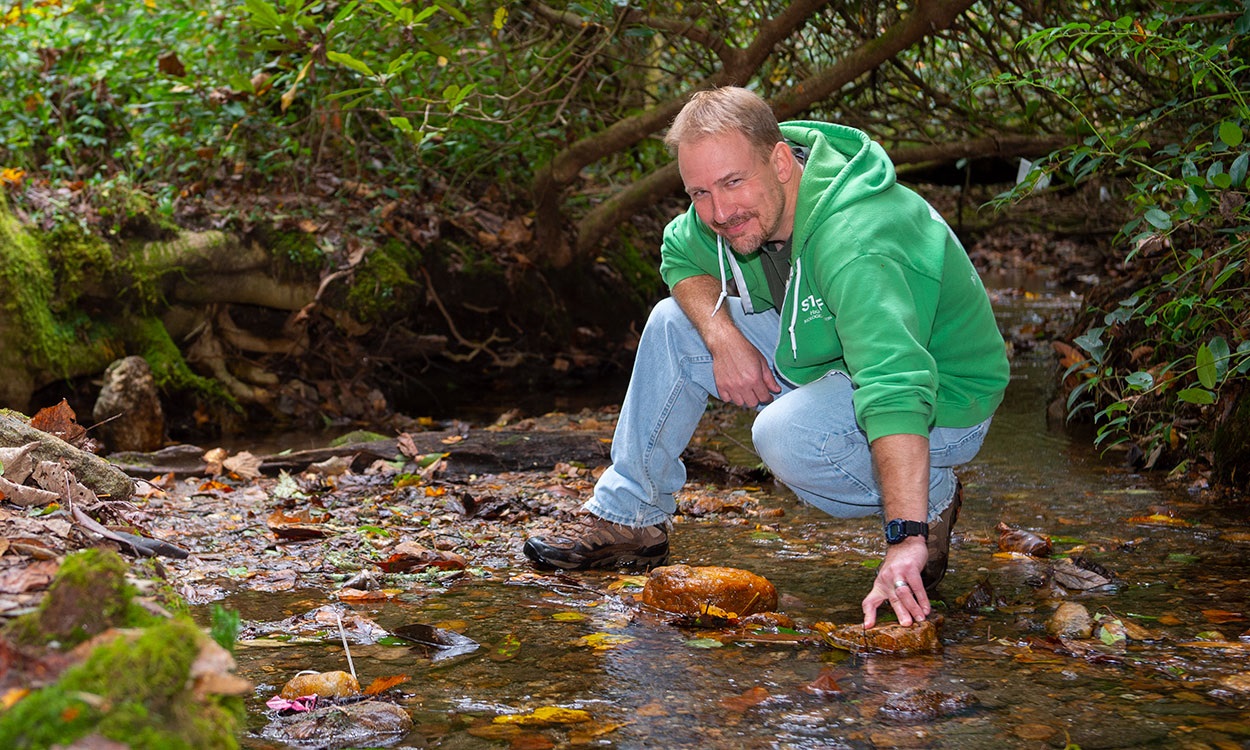Highlands Biological Station specialist named environmental educator of the year

Patrick Brannon, a biologist with research experience in herpetology and mammalogy, has been affiliated with the Highlands Biological Station for 15 years.
Patrick Brannon, the outreach education specialist at Highlands Biological Station, has been named environmental educator of the year by the Environmental Educators of North Carolina organization.
EENC is a nonprofit membership group for professional development, networking and promotion of excellence among environmental educators in the state. The group provides resources, training, events and a certification program.
“To be selected for an award such as environmental educator of the year is a real honor,” said Tanya Poole, the state Project WILD coordinator, southern mountain education specialist for the N.C. Wildlife Resources Commission and a board member for EENC. “There are thousands of environmental educators across the state, all doing amazing work. Patrick should be proud that a peer or supervisor thought enough of his ability as an environmental educator to nominate him.”
The Highlands Biological Station, located in Highlands along with its accompanying nature center and botanical garden, is an installation of Western Carolina University. The 23-acre facility includes research and teaching laboratories, and features regular public programing.
“I am grateful to EENC for this honor,” said Brannon. “Informal science education extends student learning beyond the classroom. Outdoors and hands-on activities can inspire, build confidence and increase the curiosity for learning, which leads to academic achievement and desire for science careers. I hope to continue teaching the children of Western North Carolina about nature for many years to come.”
Brannon, a biologist with research experience in herpetology and mammalogy, has been with the Highlands Biological Station for 15 years. Offering a selection of more than 50 programs, he strives to make each “place-based” and relevant to the Southern Appalachian region, while fulfilling requirements of state curriculum standards for each grade level.
“I especially enjoy sharing my love of salamanders with children, and adults, too,” Brannon said. “This is, after all, the salamander capital of North America, if not the world. Yet many visitors and even locals have seldom seen one up close, much less understand their biology and why they are so diverse here.
“The patterns of and reasons for the biodiversity in salamanders can also be applied to so many other biological groups in our mountains. Getting people, especially children, to make those connections themselves is a rewarding experience. The goal is that once people understand the natural world around them, they will gain a greater appreciation for it, which will in turn lead to greater environmental stewardship and conservation efforts.”
Brannon said that too often students are taught to memorize a series of facts or they can look up information on the internet. But being able to use hands-on experiences, including participation in scientific research opportunities, makes a much more long-lasting impact than memorization. The ability to use critical thinking skills to apply those facts to solve real-world problems will help them to make informed decisions as future community leaders, he said.
During the previous school year, the outreach program served nearly 9,800 students through more than 250 programs presented at 54 different schools across the region.
“This award is a great thing for Patrick, Highlands Biological Station and WCU,” said Jim Costa, executive director of the station. “It is certainly well-deserved. He has taken outreach programming to new heights, developing over the years a truly remarkable menu of programs from elementary to high school grades, all tied to the N.C. Science Standards. These are in high demand, as are his programs for college and university groups. An excellent naturalist with a special interest in reptiles, amphibians and mammals, Patrick draws upon an intimate knowledge of the southern Appalachian fauna — often with live specimens in tow — as few educators can.”
For more information about the Highlands Biological Station, the Highlands Nature Center and programs, go to www.wcu.edu/hbs.

